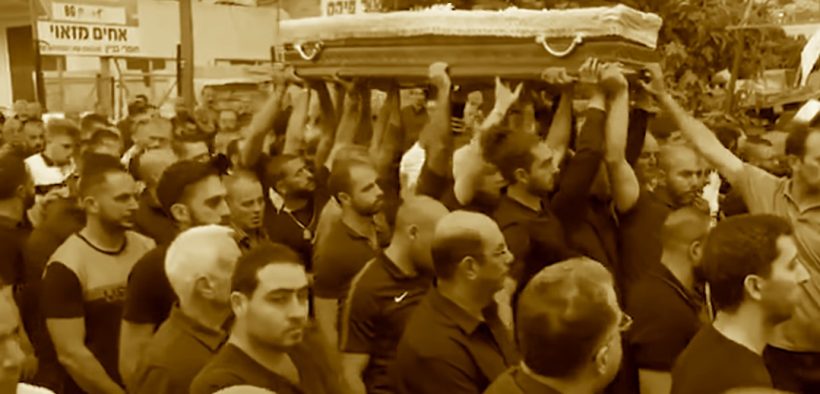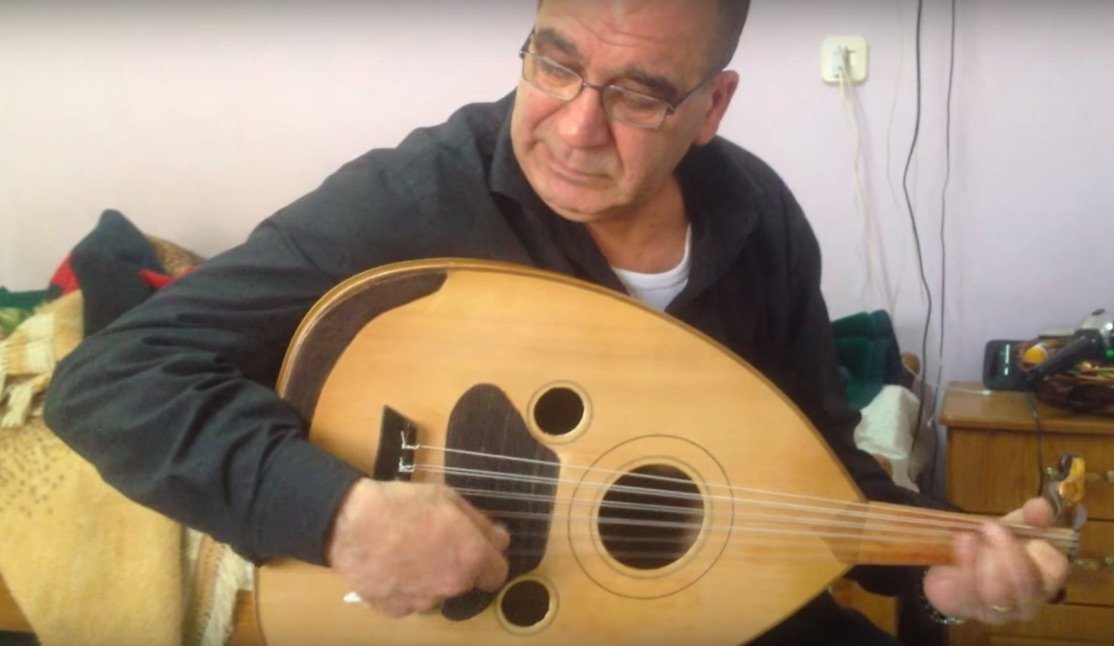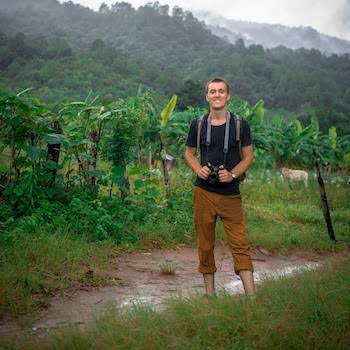Violence in the Green Line: How Policing and Crime Threaten Palestinians in Israel

While 20 percent of Israelis are Arab, sixty percent of murder victims in Israel are Arab citizens.
It’s a cool night early in Ramadan. Around a small altar of flowers, photos and candles, the street in Nazareth is filled with people. As the crowd cycles through to pay their respects throughout the night, a musician nearby plays the oud, a Middle Eastern lute.
Tawfik Zaher was a musician as well – a well-known oud player and a music teacher. Less than a week earlier, on May 6, Zaher was out in Nazareth with his 4-year-old granddaughter when he was hit in the chest by a stray bullet during a shooting and killed. They were waiting at a local bakery for Zaher’s daughter to pick them up.
Nazareth is a small Arab-majority city between the occupied Palestinian West Bank and Israel’s northern border with Lebanon. News of Zaher’s killing went viral on social media. A few days later, thousands of people gathered for the vigil in his honor, but also to protest. They demanded that the Israeli police work to help stop violence, organized crime and the flow of illegal weapons in Arab communities within the country.
Violence Disproportionately Affects Arab Israelis
Twenty percent of Israeli citizens are Arab – that’s excluding Palestinians in the West Bank and Gaza – outside the Green Line boundary – where residents aren’t citizens of Israel. Most of the Arab population lives in Arab-majority or mixed areas like Nazareth. These communities are affected by violent crime at a much higher rate than Jewish Israeli communities next door.
Sixty percent of murder victims in Israel are Arab citizens. The number of murder victims per 100,000 people is five times higher among non-Jewish citizens compared to Jewish citizens. Between 2014 and 2016, 95 percent of shootings in residential areas happened in Arab cities and towns. Excluding any violence in the occupied Palestinian territories, over 1,336 Arabs have died by homicide since 2000.
This violence stems from poverty, high unemployment and a lack of social services and funding in Arab communities. But it’s also a result of the Arab community’s relationship with police.

Tawfik Zaher playing the oud. (Youtube screenshot)
Following Zaher’s murder, Ayman Odeh, an Arab member of parliament and head of the Hadash party, cited the killing as evidence that the government has far to go to address this problem.
“Every year, violence is increasing in Arab society and has long since become a state of emergency. Coping with violence requires many resources, but first and foremost a change in the government’s worldview regarding Arab society,” said Odeh.
According to Odeh and other leaders, Palestinian areas are under-policed: there are more than 70 Arab towns and cities inside Israel and only seven have police stations. Police solve less than 20 percent of homicide cases where the victims are Arab. But when the authorities do police Palestinian areas, the communities face discrimination and police brutality.
“Arabs do not get equal service in comparison to the Jewish citizens of Israel. Many people in Israel believe that Arabs, even though many are citizens, are a security threat,” said Ruth Lewin Chen, co-manager of the Safe Communities program at the Abraham Initiatives, a civil society group in Israel that works for equal social and political rights for Jewish and Arab citizens. “This kind of perception is also very much held by some police and by the police as an organization.”
History of Violence Define Community-Police Relations
This dynamic may be improving but violent crime continues in Arab communities in large part because of the history of police violence.
The first week of October 2000 dominates discussions of police relations with Palestinian citizens.
On October 1, Palestinians inside Israel organized a general strike and demonstrations as a part of the Al-Aqsa Intifada. The demonstrations were primarily nonviolent but as some protesters threw rocks or targeted police officers, the police as a whole responded with rubber bullets, live ammunition, and tear gas. By the end of the week, Israeli police had killed 12 Arab citizens of Israel and one resident of Gaza, injured over 1,000 people, and arrested 660 people. Arab community leaders lobbied the government to investigate the violence, prompting the establishment of a fact finding mission called the Or Commission in November.
In September 2003, the Or Commission released its findings in a report: the police were not justified in using live or rubber ammunition – their use of force was not protected by Israeli law. The report also made recommendations about how to improve relations between police and Arab citizens: “The police must instill among its officers the understanding that the Arab community as a whole is not their enemy, and that it should not be treated as an enemy.”
Despite this, in 2005, an internal investigation by the Israeli police determined that no one would be charged and in 2007, the Attorney General closed all investigations.
The events of October 2000 continue to define relations between Arab communities and police; since October 2000, at least 35 Arab citizens have been killed by police and other state forces. Community leaders and the government are still working hard to improve rocky relations and many crimes still go unsolved.
Palestinian Leaders Push for Gun Control, More Arabs on Police Forces
The relationship between the people of Umm al-Fahm, a small city in central Israel adjacent to the West Bank, and the Israeli police illustrates just how hard it is to reduce violent crime. Some of the worst violence of October 2000 happened here: three demonstrators were killed and 75 were injured. Police used sniper rifles to control the crowds.
In March of last year, the imam of Umm al-Fahm’s Tawhid Mosque was shot and killed, in front of the mosque. No one was charged for the crime.
This was one of 381 shootings in the city last year, according to the Public Security Ministry. The police only opened cases for 184 of them, and these resulted in only one indictment.
According to the Mossawa Center, an advocacy organization for Arab citizens, the police are only proactive in Palestinian communities when they’re suppressing popular demonstrations. Last March, protestors rallied in Haifa and across Israel to denounce the ongoing violence in Gaza. Police responded to the demonstrations by beating protestors and arresting 21 people. The officers also broke the leg of Jaafar Farah, the director of the Mossawa Center.
In cities like Umm al-Fahm, police violence and under-policing lead to tense relations with police. This allows the firearms used in these crimes, most of which are obtained illegally, to remain in the communities.
“What happens is that when people don’t feel secure and there is no one guaranteeing their security who they feel they can turn to, they start guarding themselves, and one of the ways to do this is to get a weapon,” said Lewin Chen.
But this also presents advocates with one strategy to reduce violent crime. Arab political leaders and civil society continue have continually called for stricter gun control and for the government to stop the flow of weapons. Between 75 and 90 percent of illegal firearms in Israel come from the military, either stolen by Jewish Israelis and then sold to Arab individuals and organizations, or stolen directly by Palestinians. Only a small percentage are reportedly brought in from the West Bank.
“Our message to the police is clear. It’s failing on its duty to fight criminal organizations and illegal weapons,” said Muhammed Suboh, a member of the Committee for Fighting Violence in Tamra, a civil society group in an Arab town. “We know that if these weapons were a security threat, the police would deal with them within hours.”
To reduce the number of illegal firearms, Arab leaders have said that their communities need support from police, rather than discrimination. Arab politicians and advocates have had some success in pushing this strategy with the Israeli government.
Budget Proposal Brings Hope But Falters
In 2016, the government passed Resolution 1402 which provided funding to open 12 new police stations and hire more Arab police officers, especially Muslims. In theory, the program is a cause for hope. So far, two stations have been built, but it also appears that the budget for the program has been cut nearly in half.
This is where the government’s plans for improved policing begin to sound like many of its other programs in the Arab community. In 2015, Resolution 922 allocated at least 9.7 billion NIS (US$2.6 billion) over the course of five years to reduce inequality between Arab and Jewish communities – 47 percent of Arab households are currently below the poverty line, compared to a national average of 18 percent. Arab schools have 7,000 fewer classrooms than they need. By addressing social inequalities, 922 programs could help reduce the disparity in violent crime.
But the budget for 922 represents only two percent of the government’s annual spending on social programs and civil society groups allege that the government isn’t on track to meet its commitment. The resolution offers no specific budget for hiring Arab police officers.
But according to the Mossawa Center, as long as police attack and discriminate against Arab citizens, a bigger budget won’t help – unless the Ministry of Public Security changes its approach. Mossawa has called for the Ministry to reduce the budgets given to police to operate in Arab communities and instead invest that money in education or other social programs that can help to stem violent crime.
Since Zaher was killed in early May, two more Arabs have died from gun violence – Wissam Yassin of Tamra and Ahmed Daragmeh of Baka al-Garbiyeh.
Zaher is 57 years old, in a photo above the altar on the night of the vigil – he’s deep in concentration.”He was a quiet person, he played the oud. Everyone in Nazareth knows him, everybody loves him, he loved to live, he loved music,” said his cousin, William Zaher.
















The fundamental ethnic-cleansing-by-any-and-every-means policy of the zionists still permeates their mentality, their policies, and their police and military. Elsewhere, the “international community” world bomb into submission, but — oh, no! — not here!